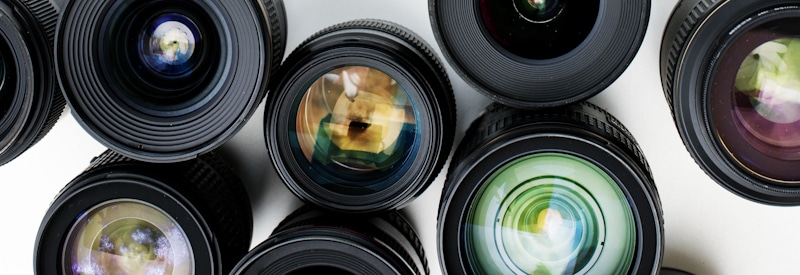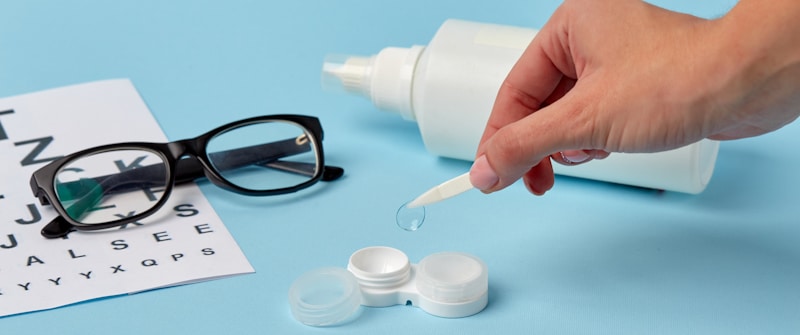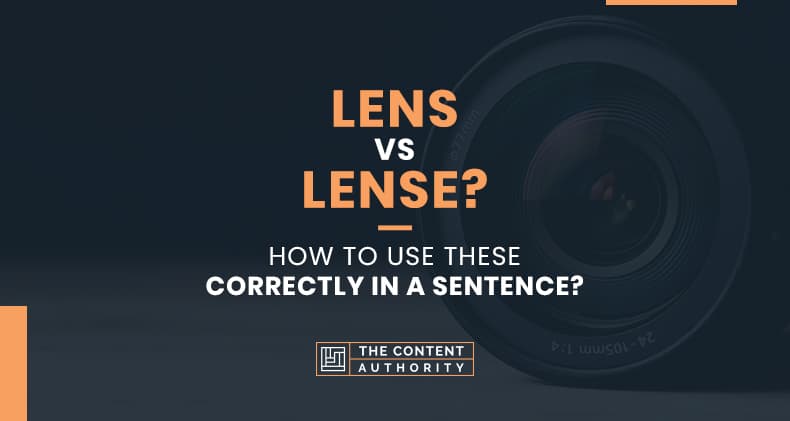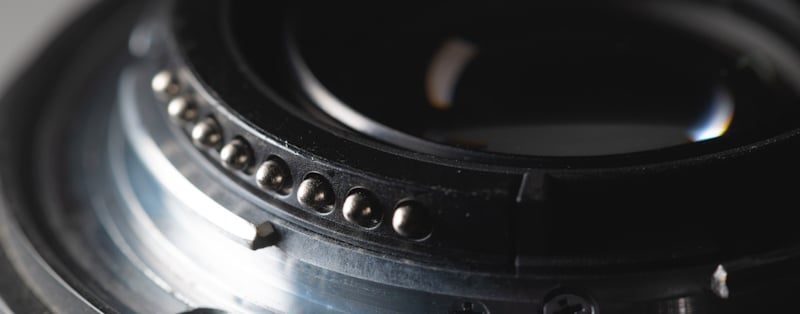Some words in the English language may have similar spellings but could be distinct from each other. But not all terms with similar spellings or pronunciation are homonyms or variations of a current word. That certainly is not the case with “lens” and “lense”.
The term “lens” denotes the curved piece of glass used in cameras, microscopes, telescopes, etc. Eyes have a built-in lens too, but that lens isn’t glass. The word “lens” can also be used in texts figuratively to denote a specific “perspective”. “Lense”, however, is invalid or a misspelling of “lens”.
If you thought “lens” and “lense” meant the same thing, or the latter was the singular version of the former, now is the time to correct your follies. Keep reading to learn more about the term “lens” and why a few in the community possibly consider ” lense” as the singular of “lens”.

“Lens” – Definition
The term “lens” denotes the curved glass piece typically used in cameras and tools that aid with human vision. First used in 1673 as a term, a lens helps disperse and concentrate light rays. The word “lens” also has a symbolic connotation, meaning “viewpoint” or “perspective”.
Generally speaking, a lens helps with clearly viewing an object or magnifying it. Lenses are commonly used in a range of devices, including cameras, microscopes, binoculars, telescopes, and eyeglasses.
Eyes have “lenses”, too. It is the more transparent portion of a vision that concentrates light to form clear images. But unlike the ones made for cameras and other equipment, the lens naturally found in the eyes is not glass.
In short, a “lens” is anything that influences and/or facilitates perception, evaluation, or comprehension.
Types of Lenses
Keeping the figurative meaning aside and considering only the tangible element, a “lens” could be of different types, which include:
- Anastigmat: An anastigmatic lens, or anastigmat, is a lens used in photography to correct three main optical aberrations: coma, spherical aberration, and astigmatism.
- Camera lens: A camera or optical lens helps focus on the image or shot in a camera.
- Compound lens: This lens setup comprises multiple lenses on a particular axis. The arrangement is designed using simple lenses closely mounted atop each other or cemented together.
- Optical condenser: The condenser is an optical lens that helps focus light on a particular object. These lenses are vital to imaging devices such as microscopes, slide projectors, telescopes, and enlargers.
- Contact lens: Also called simply “contacts”, a contact lens is a thin curved plastic or glass lens that sits over the cornea to facilitate better vision. The lens is transparent by nature but could have a slight color tinge for aesthetics and easier handling.
- Converging/convex lens: A converging lens helps focus or bring a light beam passing through it to a specific point. Since the light rays are concentrated, the lens is called a “converging lens”.
- Diverging/concave lens: A concave lens does the opposite of what a convex lens does. Instead of concentrating light rays, it causes parallel light beams to spread out or diverge.
- Ocular lens (eyepiece): The lens is attached to optical devices, such as microscopes and telescopes, to magnify the image being looked at. It’s called an “eyepiece” because it’s incredibly close to the eye when viewing an object.
Some other types of lenses worth a mention include “crown lens”, “ocular lens (eyepiece)”, “intraocular lens”, “field lens”, “meniscus”, “monocle”, and “object lens”.
What Material is a Lens Made of?
The material a lens is made of depends significantly on its application or use-case. Contact lenses, for instance, are not made of glass.
The lenses used for cataract surgeries are usually made of acrylic or silicone – be it monofocal, multifocal, toric, or any other lens type. It will be outright stupid and hazardous to place glass objects into human eyes.
The lens used in and on cameras, microscopes, and similar equipment are almost sure to have a glass build, thanks to the good optical and scratch-resistance properties of glass. Also, because lenses, when incorporated into equipment, do not directly contact the human eye, it would be unwise to not tap into glass’s performance benefits.
However, the lens used in cameras and similar equipment could be made of materials other than glass – such as fluorite, quartz glass, plastics such as acrylic, and meteoritic and germanium glass.
What Does “Lense” Mean?
The term “lense” has no meaning whatsoever as it’s not an acceptable English term. It is a misspelling of the term “lens” and gets seldom used in texts. Some writers, who do use the word in their writings, incorrectly assume it to be the British version of “lens”. To writers who don’t know better, the misspelling “lense” has no place in British, Australian, Canadian, Indian, or any other form or dialect of English.

Using the Term “Lens” in Texts
The noun “lens” is a singular word, and its plural form is “lenses”, despite the spelling suggesting otherwise. When used in sentences, it usually denotes a camera lens, contact lens, or the natural lens in the eyes. For example:
- I wanted to purchase a macro lens to take solid close-up portrait shots of my subjects.
- The colossal camera lens grabbed the fancy of more than a few in the hall.
- She has an array of contact lenses in different hues.
As mentioned above, the word “lens” has a symbolic meaning. Looking at something via the “lens” means to approach an issue from someone else’s perspective.
Here are a few sentences that use the term “lens” symbolically:
- Shoplifters may be mentally ill, and it’s imperative to view the theft through a psychological lens.
- If you read a book through a Marxist lens, your opinion on the material would be heavily influenced by that perspective.
This figurative usage of the term could be done in multiple ways and in different fields. Such symbolic use of the word in texts is not rare and also not difficult to comprehend or discern from the camera equipment-specific definition.
As alluded to above, there is the tendency to view “lens” as the plural form of “len”, which isn’t a proper word. Here are sentences that clearly illustrate how to use the singular and plural form of the word in texts:
- Though a smartphone is not primarily purchased for its camera prowess, it’s still worth your while to learn more about the kind of lens being used with the camera. (Singular)
- The company offers a wide range of lenses to choose from for its cameras. (Plural)
“Lens” and “lenses” are not interchangeable in the above sentences, and the term “lense” cannot be used in either of the two.
Some of the phrases/terms that “lens” commonly features in are “fish-eye lens”, “telephoto lens”, “objective lens”, “wide-angle lens”, etc.
Using “Lense” in Place of “Lens”
The plural of “lens” is “lenses”. That makes quite a few believe that it’s okay to spell “lens” as “lense”, which isn’t.
- My camera lens cracked. (Correct)
- My camera lense cracked. (Incorrect)
Since it’s a mistake some people genuinely make, it’s imperative to reiterate “lense” is not a valid English term and should, therefore, not be used in texts.
That said, “lense” might get used figuratively at times, as in the phrase “a historical lense”. Even such usage is scarce and sporadic, however. And in the camera world, “lense” has no place or purpose.
How Not to Confuse Between “Lens” and “Lense”
If you’re confused between “lens” and “lense”, do not be. Discard “lense” altogether. If the spellings seem confusing a tad, remember “lens” always ends with “s”. If it helps, associate the second or last letter “e” in “lense” with “error”.
To make the term “lens” plural, add the letters “-es” to the term, as in “lenses” – staying in line with English grammar conventions. Singular words that end with “s” include “octopus” and “bus”. Their plural forms are “octopuses” and “buses”, respectively.
Example Sentences with the Term “Lens”
The following are sentences that use the term “lens” or “lenses” correctly and in proper contexts:
- The boy lost his contact lens during practice.
- Her left contact lens was dry and had to be replaced.
- A clean camera lens ensures excellent pictures.
- The spacing irregularity thus has a convex lens’ effect.
- The lens and mirror are generally merged into one piece.
- He used spectacle glass or an ordinary convex lens.
- I don’t think the lenses on my glasses are in line with my current prescription.
- That camera lens is costly.
- Professional photographers carry multiple types of lenses to a shoot.
- Most expensive cameras come with an auto lens cleaning functionality built-in.
- After the eye exam, she was prescribed corrective lenses.
- Make sure the microscope’s lens is clean.
- The sci-fi drama is not perfect, but it astutely dealt with real-world problems via the lens of fantasy.
Conclusion
In English, quite a few words have alternate spellings. “Lens” is not one of them, or “lense” isn’t the word’s other spelling. Though online dictionaries are attempting to define “lense” or correlating it with “lens”, “lense” is not a valid term and shouldn’t be used in texts.
Shawn Manaher is the founder and CEO of The Content Authority. He’s one part content manager, one part writing ninja organizer, and two parts leader of top content creators. You don’t even want to know what he calls pancakes.


